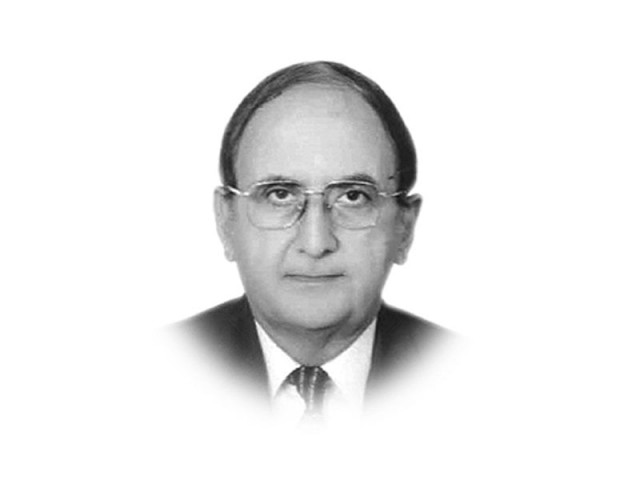Time to think straight
The govt and military need to send out sharp and clear-cut messages that they will not tolerate any violent agenda.

The writer is an independent political and defence analyst. He is also the author of several books, monographs and articles on Pakistan and South Asian Affairs
The most significant regional development is the expected surge of the Afghan Taliban after the drawdown of the US/Nato troops from Afghanistan by the end of 2014. The Afghan Taliban are not expected to take over Kabul but they can either make life miserable for any Kabul government, or establish strongholds in southern parts of Afghanistan (bordering Pakistan) or both.
The increased internal strife, especially the strengthening of the Afghan Taliban’s position in Afghan territory adjoining Pakistan will have two ramifications for us. First, it will strengthen militant groups based primarily in Pakistan’s tribal areas because it will be easier for them to cross over to Afghanistan than it is now. The same can be said about the Afghan Taliban, which will treat the Pakistani tribal areas as their ‘strategic depth’ in their fight against the Kabul government.
Second, as the Afghan government will find it difficult to cope with the security challenges caused by the Afghan Taliban, it will accuse Pakistan of aiding and abetting them. It will also reject Pakistan’s claim that militant groups on our side are using Afghan territory to save themselves from the reach of Pakistan’s security forces.
These problems will add to Pakistan’s internal problems, which include a faltering economy, price hikes and unemployment, an energy crisis and internal insecurities caused by religious extremism manifesting in the shape of sectarianism and terrorist attacks. The intensified political polarisation in Pakistan, especially the growing extra-parliamentary pressures caused by dharnas and street marches by some political parties are complicating the task of governance and political management for the federal government.
The escalation of the Afghan Taliban violence in Afghanistan will cause another problem for Pakistan. Some seminaries and religious political groups are going to come out openly in favour of the Afghan Taliban. They are likely to send their volunteers to fight in Afghanistan, as some of them did in the late 1990s in support of the Taliban government in Kabul in its fight against the Tajiks and Uzbeks of northern Afghanistan. Pakistan’s security establishment is expected to stay aloof from such activity but it will find it difficult to control this cross-border movement.
It is imperative for Pakistan’s civilian leadership and the military to do a down-to-earth self-examination of their approaches to religious extremism, militancy and especially the hangover of using some militant groups as an instrument of the state’s security agenda in the neighbourhood. It is not enough to declare that our civilian and military leadership is opposed to religious extremism and terrorism or mourning how Pakistan’s external adversaries are sponsoring these troublemakers.
The federal and provincial governments are often indecisive about taking tough action against known militant and sectarian groups because they do not want to lose political support or they think that the exit of the US/Nato forces from Afghanistan will defuse militancy in Pakistan. They would like to hold back any tough security action against militant groups for the time being to enable these groups to voluntarily adopt a peaceful disposition towards Pakistan as foreign troops withdraw from Afghanistan.
Such a soft approach has enabled militant and sectarian groups to entrench themselves in society, especially in Punjab. These groups have also created strong mutual networking and support bases in urban centres of Pakistan. Therefore, any action against them will face some political opposition and retaliatory violence.
The military appears to have turned against most of these militant groups but it is difficult to suggest if it has completely given up on the Punjab-based militant groups, which possess right-wing ultra-nationalism and anti-India sentiments. The military needs to come out unambiguously on rejecting all mainland militant groups, which engage in extremist and violent activities and/or engage in extremist hate speeches and sectarianism.
The federal government cannot continue causing confusion in the name of holding talks with militants, which have been a non-starter from the beginning. It needs to review its dual-track policy of letting the interior minister play the anti-America card with the prime minister talking of moderation and good relations with the US.
If the government and the military cannot adopt an unambiguous policy of increasing their effective control of the tribal areas and do not strengthen security on the Pakistan-Afghan border in 2014, they will find it difficult to administer these territories. Similarly, a firmer operational strategy is needed to deal with mainland militant groups and their networking though effective intelligence and policing work.
The federal government and the military need to send a clear-cut and sharp message to militants and their affiliates that Pakistan will no longer tolerate any group with a violent agenda. These groups should not be allowed to build support for themselves by playing up the Kashmir issue and anti-India and anti-US sentiments. The civilian and military authorities should also create a strong narrative to justify their counterterrorism policies and neutralise the anti-state propaganda carried out by militant groups.
Published in The Express Tribune, January 13th, 2014.
Like Opinion & Editorial on Facebook, follow @ETOpEd on Twitter to receive all updates on all our daily pieces.














COMMENTS
Comments are moderated and generally will be posted if they are on-topic and not abusive.
For more information, please see our Comments FAQ